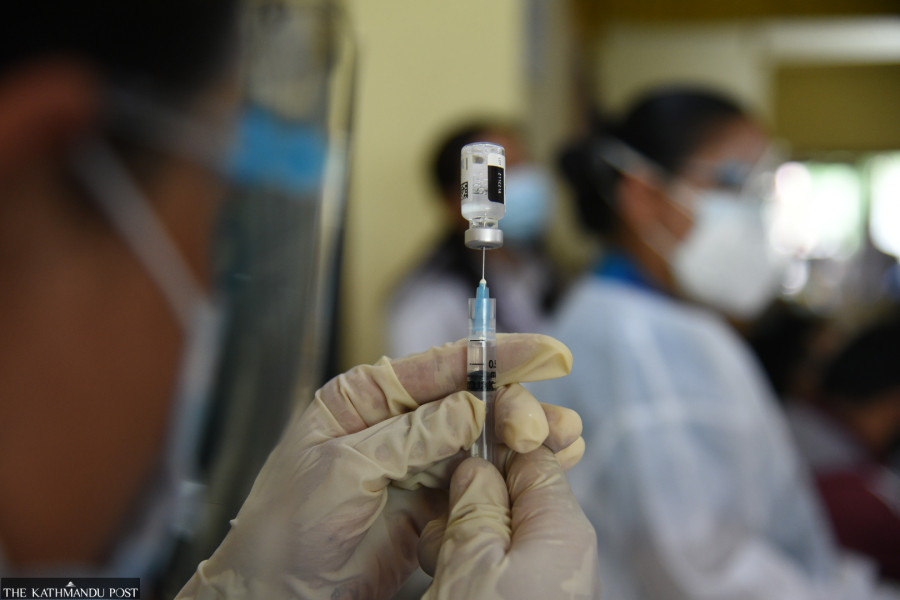Health
Two Covid-19 vaccines set to start trials in Nepal
Developers of a Chinese vaccine have promised 500,000 doses for free while a French firm will provide its vaccine at a cheaper rate.
Prithvi Man Shrestha
Two Covid-19 vaccine candidates developed by Chinese and French and British multinational companies have received permission from the government for conducting clinical trials in Nepal.
Officials said a messenger RNA (mRNA) Covid-19 vaccine jointly developed by China's Suzhou Abogen Biosciences, the Institute of Military Medicine under the Academy of Military Sciences and Walvax Biotechnology Co Ltd, and another developed by Sonafi, a French multinational company in partnership with GlaxoSmithKline (GSK), a British company, have received the final approval from the Department of Drug Administration and the Nepal Health Research Council.
Earlier, the Cabinet had decided to allow them to conduct the third phase clinical trials, also the last phase trials, in some of Nepal’s hospitals.
“Last week, we granted the vaccine manufacturers permission to import the vaccines and conduct the third-phase clinical trials in Nepal,” Santosh KC, information officer at the Department of Drug Administration, told the Post.
“We have also set certain conditions for the trials. For instance, the companies must report about adverse incidents, follow ethical practices, and inform the department for termination of any clinical trials.”
After obtaining approval from the department, these companies are preparing to launch the trials, according to an official of the council.
Namita Ghimire, a member of the ethical board at the council, told the Post that the companies are likely to start the trials this week.
The Chinese companies have partnered with Nepal’s Deurali-Janta Pharmaceuticals Pvt Ltd to conduct their trial among 3,000 volunteers at the BP Koirala Institute of Health Sciences in Dharan.
As per the proposal submitted by Sonafi in collaboration with the International Vaccine Institute, a nonprofit initiative of the United Nations Development Programme, a trial will be conducted on 3,000 volunteers at the Dhulikhel Hospital in Kavre and the Nepalgunj Medical College in Banke.
Another Chinese company—WestVac Biopharma Co, Ltd—has also sought the council’s approval for the final phase trial of its vaccine in Nepal, according to the council.
As per the Vaccine Clinical Trial Guidelines introduced by the government in June, a company or organisation wishing to conduct a clinical trial of a vaccine in Nepal has to submit an application to the council by incorporating information including details of the vaccine, volunteers and areas where the trials will be conducted; process of the trial; and potential risks to the volunteers and ways to control such risks.
After an application is received, internal and external reviews are conducted, feedback is sought and a proposal is sent to the Ethical Review Board under the council, which can approve or reject the application.
If approved by the board, the council has to forward the application/proposal to the Health Ministry for further approval by mentioning the benefits of the vaccine for Nepal. The council must also ensure the availability of the vaccine for Nepal following the third phase trial.
After the ministry’s approval, the proposal is tabled at the Cabinet. If it gets the Cabinet nod, the Department of Drugs Administration issues a licence for conducting the trial.
The mRNA vaccine developed by the Chinese companies and the one developed by Sonafi and GSK have completed the entire approval process, according to officials.
According to Ghimire, the council has ensured the availability of the vaccines from these companies once they obtain emergency use authorisation from the World Health Organisation.
“The Chinese manufacturers of the mRNA vaccine have promised to deliver 500,000 doses of the vaccine to Nepal free of cost,” she said. “In the case of the Sonafi vaccine, Nepal will get the vaccine at a cheaper rate through GAVI, an UN-backed vaccine alliance.”
GAVI is a public-private global health partnership established with the goal of increasing access to immunisation in poor countries.
Sonafi has not promised local production but the Chinese companies developing the mRNA vaccine have also proposed local manufacturing of the vaccine if the trial becomes successful, according to the council.
Nepal so far has been relying on external supply for Covid-19 vaccines, mostly from China, to inoculate its people.
In early August, the government also announced a number of incentives for domestic and foreign companies that want to establish plants in Nepal to produce vaccines against Covid-19 and other infectious diseases.
As per a notice issued on August 9, the government has promised a procurement guarantee for 60 percent of the total vaccine demand in the country while assuring credit at subsidised interest, tax and duty exemptions on the import of machinery and electricity tariff waiver.
As of Monday, 5.83 million Nepalis received first doses of Covid-19 vaccines while 5.19 million people have been fully vaccinated either with single or double doses, according to the Ministry of Health and Population.




 11.84°C Kathmandu
11.84°C Kathmandu















